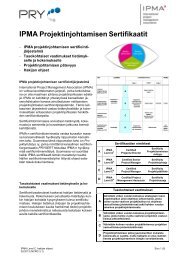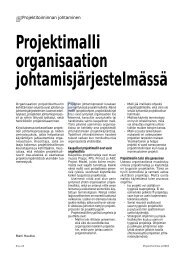Boundary activities and readiness for ... - Projekti-Instituutti
Boundary activities and readiness for ... - Projekti-Instituutti
Boundary activities and readiness for ... - Projekti-Instituutti
Create successful ePaper yourself
Turn your PDF publications into a flip-book with our unique Google optimized e-Paper software.
Discussion<br />
program also has an effect on the program’s external relations <strong>and</strong> on how<br />
they should be h<strong>and</strong>led.<br />
Choi (2002) proposes that teams that deal with complex tasks <strong>and</strong> involve<br />
external dependencies have a greater need <strong>for</strong> external <strong>activities</strong>. The<br />
current study provides support <strong>for</strong> these propositions, indicating that high<br />
program complexity increases the need <strong>for</strong> boundary <strong>activities</strong>. Complex<br />
large-scale programs that aim at wide changes in the parent organization<br />
<strong>and</strong> include a large number of projects to deliver those changes tend to have<br />
numerous linkages <strong>and</strong> interdependencies with the parent organization.<br />
The need to manage these relations with different intra-organizational<br />
stakeholders may contribute to the large amount of boundary activity that<br />
is needed to achieve the required level of <strong>readiness</strong> <strong>for</strong> change program<br />
implementation. This proposition is supported by the findings in case<br />
Chain where the case program was highly complex <strong>and</strong> aimed at large scale<br />
changes, <strong>and</strong> where both the most active boundary management <strong>and</strong> the<br />
highest <strong>readiness</strong> <strong>for</strong> change program implementation were observed. In<br />
Center’s case, the highly complex change program showed fairly passive<br />
boundary management, <strong>and</strong> the program failed to demonstrate the<br />
required <strong>readiness</strong> to proceed to implementation. Bureau’s change program<br />
appeared as less complex, which might indicate that even a somewhat<br />
smaller amount of boundary <strong>activities</strong> than in case Chain was enough to<br />
create the required <strong>readiness</strong> <strong>for</strong> change program implementation.<br />
The initial maturity of the parent organization in terms of initiating <strong>and</strong><br />
implementing large-scale change was recognized as the third relevant<br />
factor behind the findings. Previous research has suggested that some<br />
organizations are more receptive to change than others. The overall change<br />
capacity of an organization has been defined as its ability to develop <strong>and</strong><br />
implement appropriate organizational changes, which consists of several<br />
aspects, such as the availability of human capabilities <strong>and</strong> the<br />
characteristics of organizational structure, processes, systems, <strong>and</strong> culture<br />
(Judge & Douglas, 2009; Klarner et al., 2008).<br />
The current study has assessed <strong>readiness</strong> <strong>for</strong> change program<br />
implementation in three case organizations at the end of the program<br />
initiation <strong>and</strong> planning stage. The observations indicate that the starting<br />
level, in terms of the overall change capacity or the initial <strong>readiness</strong> <strong>for</strong><br />
change, differed between the cases. Even though none of the three case<br />
organizations could be described as experienced or mature in terms of large<br />
change programs, there were still recognizable differences. In case Center,<br />
the organizational maturity in terms of change projects, let alone change<br />
programs, appeared poor <strong>and</strong> the conditions <strong>for</strong> initiating a change<br />
program seemed unfavorable, suggesting that maybe the challenge of<br />
193









